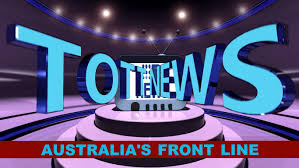With TOTT News and Glenn Greenwald
So extreme has Australia’s push to censor free speech become that it is now making international headlines and being condemned worldwide.
Here is the internationally renowned and highly respected Glenn Greenwald on what is going on in Australia. Greenwald was one of the key figures behind the Edward Snowden’s exposes of global surveillance programs in Britain and America.
It looks like this may have already been shadow banned on YouTube, so if you have trouble finding it Glenn is also available on the free speech platforms Rumble and X.
New laws introduced by the federal government, if passed, will give Australia’s media regulator the authority to crack down on tech companies for the spread of ‘misinformation’ and ‘disinformation’ on their platforms.
The federal government has reintroduced their controversial Thoughtcrime Bill, designed to ‘combat the dangers posed by misinformation and disinformation’ in the digital age.
As part of the new crackdown proposal, big tech is being threatened with significant fines.

The legislation would give the Australian Communications and Media Authority (ACMA) new powers to demand social platforms keep records on ‘harmful content’, and hand them over.
According to the government press release: “The bill will empower the ACMA to review the effectiveness of digital platform systems and processes and will improve transparency about measures platforms have in place to protect Australians from mis and disinformation.”

Communications Minister, Michelle Rowland, says some “75 per cent of Australians” are ‘concerned about the harmful impacts of misinformation and disinformation’.
“Digital platforms can also serve as a vehicle for the spread of misleading or false information that is seriously harmful to Australians. The rapid spread of seriously harmful mis and disinformation poses a significant challenge to the functioning of societies.”
She highlighted “the spread of false information” surrounding the Bondi Junction stabbing attack, and a stabbing incident in Southport in the U.K, as “alarming”.
Critics of the bill have lashed out with concerns over making social media companies the arbiters of truth, a nightmare we already saw with government-ordered COVID censorship.
Independent Senator, David Pocock, says he’s concerned the government is treading into uncharted territory.
“In Australia, without a human rights act or some sort of Bill of Rights that enshrines freedom of expression, we have to tread carefully when we start talking about policing misinformation and people’s views. I’m concerned that this legislation is essentially putting the onus on social media companies to deal with this.
I don’t think there’s a lot of trust in those social media companies at the moment.”
Rowland says the bill has ‘carefully calibrated definitions of serious harms that aligns with Australia’s human rights obligations’.
“Digital platforms may be subject to civil penalties of up to five percent of global turnover for breaches of a standard and up to two percent for codes. These penalties are high. However, they may be necessary in response to egregious and systematic breaches and failure to act.”
But just what type of content is considered ‘harmful’?
Others have slammed the bill as a fundamental attack on Western freedoms, including from Elon Musk, who called the Australian government “fascists” in response.


Australia: once again making international headlines for all the wrong reasons.
These laws have come after the draft bill was released last year and ultimately ended up rejected due to backlash, as covered here on TOTT News.
But, as always, those pulling the strings will get their plans through one way or another, and said they would be back again in 2024.
Now, in 2024, the battle for free speech, and ultimately thought, re-ignites again.
BACK AGAIN, AS EXPECTED
We told you it would be back, and here we are again. Yet another moment where the fundamentals of Western democratic values are at risk again, right after many social media heads like Musk and Zuckerberg openly admit COVID censorship was ‘wrong’.
Now it seems they won’t have a choice but to continue to police ‘misinformation’, despite a relaxation on censoring subjects like medical questioning in the time since the ‘pandemic’ ended.
Let’s recap how we ended up in this position, for those who may not be aware.
The push for this legislation began in March 2022, when the government announced plans to introduce news laws that would ‘combat online misinformation’.
After the election, Labor would continue the moves of the former Coalition government (highlighting the illusion of ‘government’, introducing the draft bill to the dismay of any free thinker in this country.
But the backlash was significant at the time.
At the time, the Australian Human Rights Commission said the misinformation bill would actually risk the freedoms it was supposedly aiming to protect.

In November last year, the Albanese government announced they would be overhauling the original draft bill, following widespread opposition to the move.
The government announced a delay in presenting the legislation to parliament until “sometime in 2024”, as they “adjusted their strategy” to ‘accommodate for concerns’.
The initial bill wasn’t successful, but they were able to achieve some groundwork.
Two mandatory standards aimed at child safety were released by the regulator last year, in which providers should “detect and remove child-abuse material and pro-terror material where technically feasible” – as well as “disrupt and deter new material of that nature”.
Apple warned the proposal to force tech companies to scan cloud and messaging services for child-abuse material risks was “…undermining fundamental privacy and security protections” and “…could lead to mass surveillance with worldwide repercussions“.
And it doesn’t just end with social media.
The federal government says it is also introducing new separate legislation to outlaw what’s known as ‘doxing’ – where people who maliciously publish personal details about someone online, could face a jail sentence of up to seven years.
Now, with this law, the gates of a private-less future will be well and truly open.
Australia has positioned itself as a ‘world leader’ on the front to ‘fight disinformation’, with our e-Commissioner attending Davos 2023 and our pledge to ‘reclaim the internet’.
Here in Queensland, we have just seen the elevation of a similar thoughtcrime bill that is aimed at ‘preventing vilification’ online.
Will the government finally succeed with their vision for a modern age Thought Police written in law?
And if so, where does this lead as the definitions and scope become more broadened over time?
If you doubt that the Australian government is itself a major source of disinformation just think of the terms “safe and effective” and “cheap and reliable”.
We’ll leave you with this:



